Original URL: https://www.theregister.com/2009/10/05/review_storage_crucial_ssd/
Crucial CT256M225 256GB SSD
The best value solid-state drive yet?
Posted in Personal Tech, 5th October 2009 12:02 GMT
Review Crucial supplies a fair amount of information about its CT256M225 256GB SSD, including the facts that it uses MLC Flash, has a read speed of 250MB/s, a write speed of 200MB/s and comes with a 64MB cache.
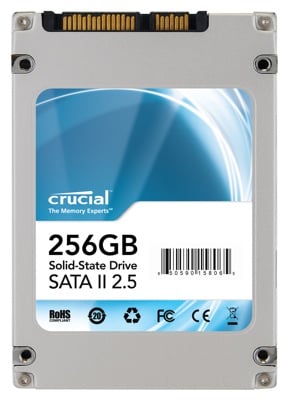
Crucial's CT256M225: Indilinx' controller on board
The one piece of data that is clearly missing is the identity of the controller chip. Generally speaking, that question would be easily solved with a quick look inside the casing. Usually, this would be a simple job as you remove four (fiddly) screws, pop open the two halves of the casing and then possibly remove four more screws to release the circuit board from the casing.
Things weren’t so simple with the CT256M225. Only one side of the casing could be released which gave us a view of eight memory chips.
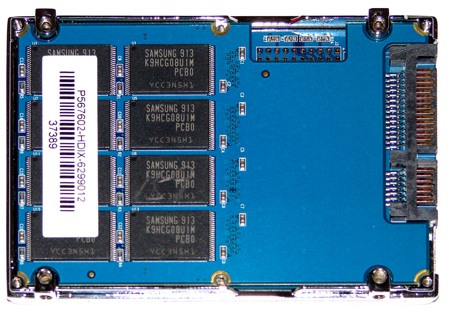
Eight NAND chips...
The top cover of the drive is held in place with double-sided tape and has to be pulled off with a modicum of brute force to reveal... eight more NAND chips.
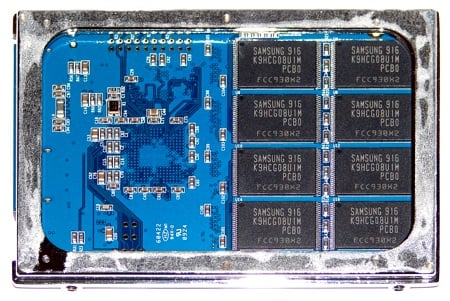
...and eight more NAND chips
Squinting inside the case it was clear that Crucial has sandwiched two circuit boards together. We winkled out the uppermost part of this electronic sandwich and in the middle we found the controller chip and cache chip along with another 16 Flash chips. That’s a total of 32 memory chips with 8GB of storage on each chip along with 64MB cache but the intriguing thing is that the controller chip is anonymous and carried no markings.
We connected the Crucial drive to a Core i7 test bench and saw that the firmware version of the drive was 1571, which is the same version that we saw on the Patriot Torqx that we recently a little while ago.
This coincidence suggested that the two SSDs use the same controller, and a swift call confirmed that the Crucial CT256M225 does indeed use an Indilinx Barefoot controller.
HDTach 3.0.1 Throughput Results
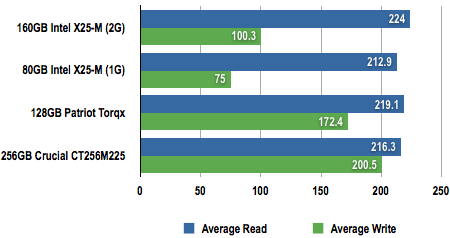
Data throughput in Megabytes per Second (MB/s)
Longer bars are better
The drive's method of construction means that the SSD is necessarily quite chunky and will fit inside your laptop provided it has a 9.5mm drive bay but if it has a quarter-inch drive bay you’ll need a slimline SSD from the likes of Intel.
Crucial has used Flash chips with the same 8GB density as those in the Patriot Torqx and as the two SSDs use the same controller with the same version firmware, we expected that the two drives would behave in a similar fashion to each other.
As it happens things didn’t turn out quite that way.
Using the synthetic HD Tach 3 benchmark we got average read speeds for both drives that were effectively identical. However, the average write speed was a full 30MB/s higher for the Crucial drive.
CrystalDiskMark Results
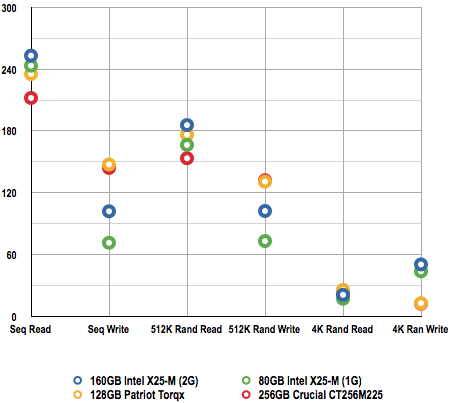
Speeds in Megabytes per Second (MB/s)
Higher points are better
The situation was reversed in CrystalDiskMark 2.2 where the read speeds remained the same, but this time the Patriot had faster write speeds than the Crucial by some 20MB/s.
If you take the two sets of synthetic benchmarks together, the Patriot and Crucial SSDs have the same level of performance. However, the variations in write speeds are noteworthy.
ATTO Test Results
Crucial CT256M225
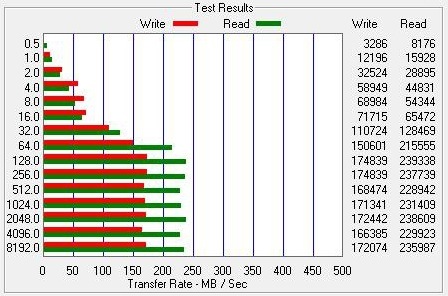
In our real-world file transfer tests, we copy folders that contain 2GB of files. We started, as usual, by transferring files within the drive and saw that the time taken for the test was pretty much identical for the Patriot and the Crucial. When you consider that the two drives are very similar, apart from their capacity, this is what we expected to see.
Transferring files from one drive to another revealed a more complex situation. When we used a second-generation Intel X25-M drive as the other half of the pair we saw that the Crucial SSD was marginally slower than the Patriot when reading files from the Intel drive. That’s marginal as in a fraction of a second out of 16 seconds, which equates to around six per cent. By contrast, when we read files from the test drive and wrote them to the Intel X25-M, we found that the Crucial drive was significantly faster than the Patriot to the tune of five seconds with big movie files and ten seconds with smaller music files. That’s a huge margin of 25 per cent in favour of the Crucial.
As a final test we switched the paired SSD from the 160GB X25-M to the older, first-gen 80GB X25-M and this threw up some more oddities.
ATTO Test Results
Intel X-25M 2G
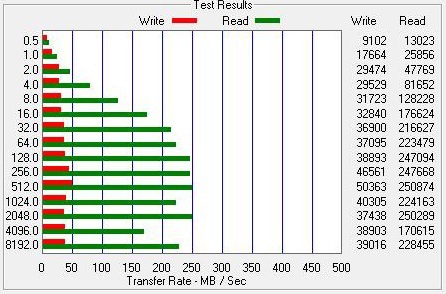
When we transferred files between the original X25-M and the Patriot all of the transfer speeds slowed by a significant amount. In the case of the Crucial drive, the read times were unaffected but the write times took a similar clobbering to those that we saw on the Patriot.
It's something of a mystery why the Crucial drive is so much faster than the Patriot when the two drives share the same controller and firmware but Crucial definitely has an advantage. Or rather, the 256GB Crucial has an advantage over the 128GB Patriot. Crucial is launching the M225 SSD with capacities of 64GB, 128GB and 256GB, and the three models have differing read and write speeds. The 256GB M225 Crucial has a 250MB/s read speed and a 200MB/s. The 128GB model has the same 250MB/s read speed and a slower, 190MB/s write speed, while the 64GB limps along at 200MB/s ead and 150MB/s write.
2GB File Transfer Results
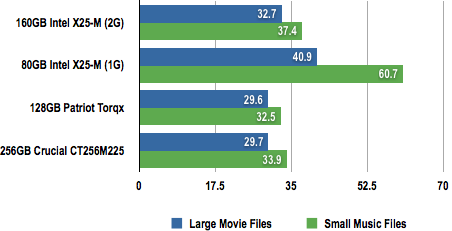
Time in Seconds (s)
Shorter bars are better
By this stage in the proceedings we were feeling warm and affectionate towards the 256GB Crucial. But those emotions can often be shattered when the subject of money is raised. You can currently buy the 128GB Patriot Torqx for £287 which works out at £2.25 per Gigabyte, while a budget Kingston SSD Now V costs £1.45 per GB.
Imagine our surprise when we found that Crucial lists the CT256M225 for £421 at its own web store - £1.70 per GB - and we’ve found it on sale elsewhere at £380 which is £1.48 per GB. To put that in perspective, the second-gen Intel X25-M, which is much cheaper than its predecessor, costs £334 for 160GB which works out at £2.09 per GB.
There’s no denying that the thick end of £400 is a hefty price to pay for storage, but Crucial is delivering superb value for money and a level of performance that is quite astounding.
Verdict
The 256GB Crucial M225 delivers in every department and shows that you can get performance and decent capacity at a reasonable price. ®
More SSD Reviews...

Intel X-25M |

Kingston SSD Now V |

Patriot Torqx |

OCZ Vertex |